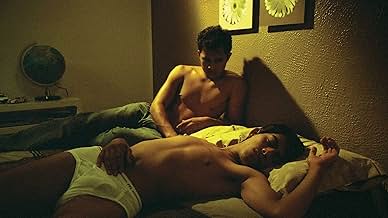PUNTUACIÓN EN IMDb
5,7/10
1,3 mil
TU PUNTUACIÓN
Añade un argumento en tu idiomaTwo students, Gerardo and Jonas, are in love. However, Jonas becomes obsessed with another boy, which leads to Gerardo moving into arms of Sergio.Two students, Gerardo and Jonas, are in love. However, Jonas becomes obsessed with another boy, which leads to Gerardo moving into arms of Sergio.Two students, Gerardo and Jonas, are in love. However, Jonas becomes obsessed with another boy, which leads to Gerardo moving into arms of Sergio.
- Dirección
- Guión
- Reparto principal
- Premios
- 2 premios en total
Clarisa Rendón
- María
- (as Clarissa Rendón)
Reseñas destacadas
The unique film "Broken Sky" is an invitation to a different world, a quiet and dreamlike place where only love seems to hold any importance. The characters Gerardo and Jonas inhabit this private world, and no one else matters. Filmed in beautiful gold and brown shades, the two Mexican boys fall in love at first sight. The two are so in sync with each other that they barely need words to communicate their feelings. It seems things could not be more ideal for these two guys, until outside influences and doubt threaten to destroy their perfect, untainted love. "El Cielo Dividido" is not really a mainstream film; there is virtually no dialog, and the production moves along like a slow, hypnotic dance, rather than the typical fast pace of todays cinema. There has rarely been a film that so effectively creates it's own world, and it is a world filled with beauty and romance and sadness, a world that i personally was reluctant to leave at the film's end. Actors Miguel Angel Hoppe and Fernando Arroyo are both beautiful and utterly believable as the confused lovers, overwhelmed by intense feelings that are so new to them. Unique especially for "gay cinema" is this film's subtlety. The nudity and sexuality is not aggressively splashed across the screen to shock or titillate the viewer. It is simply there, and it is all a part of this private world of the two lovers. Best of all, "Broken sky" manages to recreate the feelings of first time love and sexual awakening like few films have managed. This is far from the typically flashy and garishly silly style of most gay films. Thankfully, there are no gay stereotypes to be found here; this is a film about love, and nothing more. "Broken Sky" is a unique and beautiful film.
'El Cielo dividido' (BROKEN SKY) is a daring, experimental film from Mexican writer/director Julián Hernández and as such it is bound to polarize audiences. Some will fault the film for self-indulgence while others will praise the bravery of a film of this topic to come from a country not exactly known for its flexible social attitudes.
Julián Hernández focuses on the history of a first love and without using dialogue he tells his story simply with silent actors, minimal narrative comments which serve as program notes, music, and ravishingly beautiful photographic composition. Gerardo (Miguel Ángel Hoppe) opens the film, a solo youth wandering what appears to be the streets of Mexico City finally ending up in an open amphitheater where his eye glimpses another lone youth Jonas (Fernando Arroyo) sitting staring into space. Gerardo wanders over to him, sits beside him, gains the courage to touch his shoulder, Jonas responds glowingly - and love begins. Through the next scenes we find the couple making love both in bed and in unexpected public places including the stacks of the library of the school where they both are students -and where another pair of eyes enters: Sergio (Alejandro Rojo) watches longingly as Gerardo and Jonas kiss and display an aura of passion Sergio obviously longs for.
The new couple share many experiences, all bathed in love, until they eventually go to a disco: Jonas dances with an enchanted Bruno (Ignacio Pereda) and a trace of chemistry is generated, a fact that Gerardo, watching the boys dance, senses and is disturbed. A crack is created in their bliss and that crack only widens as they each have mixed responses to what they perceive is escaping. Gerardo encounters the winsome Sergio and the two bond physically, a fact that forces Jason to reevaluate his initial feelings for Gerardo.
All of this story is told without dialogue of words but with a very strong dialogue of eyes. Director Hernández seems to want to share how love is an internalized emotion, only demonstrated with physical intimacy, but fragile as a newborn in its vulnerability to wounds. Cinematographer Alejandro Cantú finds stunning settings and lighting and sensitive explorations of love making that never exceed tasteful states. His manner of showing time elapsing is to pan walls within a room that serve as flashbacks and flash-forwards as a means of carrying the story forward. Film editor Emiliano Arenales Osorio uses some very creative techniques to keep the viewer guessing as to whether we are observing fact, fantasy, present or past. And the musical score by Arturo Villela deftly maintains the minimalist stance with simple phrases by cello, harpsichord, and violin, saving the passion expression for the use of Dvorák in Rusalka's 'Song to the Moon' as ravishingly sung by Renée Fleming All of those praises being said, the major reason this film doesn't retain an audience base is its length: it is 140 minutes long, repetitive, and would have been much more powerful had it been cut to 90 minutes at best. It is far too visually stunning a piece of work to step beyond the patience of an audience happy to see the birth and blossoming and challenges of a first love between two beautiful young men. The actors are indeed a pleasure to watch, but in this case less is more. One wonders what Julián Hernández will create next. He deserves applause for this experimental film but hopefully will learn from its tendency toward self-indulgence. Grady Harp
Julián Hernández focuses on the history of a first love and without using dialogue he tells his story simply with silent actors, minimal narrative comments which serve as program notes, music, and ravishingly beautiful photographic composition. Gerardo (Miguel Ángel Hoppe) opens the film, a solo youth wandering what appears to be the streets of Mexico City finally ending up in an open amphitheater where his eye glimpses another lone youth Jonas (Fernando Arroyo) sitting staring into space. Gerardo wanders over to him, sits beside him, gains the courage to touch his shoulder, Jonas responds glowingly - and love begins. Through the next scenes we find the couple making love both in bed and in unexpected public places including the stacks of the library of the school where they both are students -and where another pair of eyes enters: Sergio (Alejandro Rojo) watches longingly as Gerardo and Jonas kiss and display an aura of passion Sergio obviously longs for.
The new couple share many experiences, all bathed in love, until they eventually go to a disco: Jonas dances with an enchanted Bruno (Ignacio Pereda) and a trace of chemistry is generated, a fact that Gerardo, watching the boys dance, senses and is disturbed. A crack is created in their bliss and that crack only widens as they each have mixed responses to what they perceive is escaping. Gerardo encounters the winsome Sergio and the two bond physically, a fact that forces Jason to reevaluate his initial feelings for Gerardo.
All of this story is told without dialogue of words but with a very strong dialogue of eyes. Director Hernández seems to want to share how love is an internalized emotion, only demonstrated with physical intimacy, but fragile as a newborn in its vulnerability to wounds. Cinematographer Alejandro Cantú finds stunning settings and lighting and sensitive explorations of love making that never exceed tasteful states. His manner of showing time elapsing is to pan walls within a room that serve as flashbacks and flash-forwards as a means of carrying the story forward. Film editor Emiliano Arenales Osorio uses some very creative techniques to keep the viewer guessing as to whether we are observing fact, fantasy, present or past. And the musical score by Arturo Villela deftly maintains the minimalist stance with simple phrases by cello, harpsichord, and violin, saving the passion expression for the use of Dvorák in Rusalka's 'Song to the Moon' as ravishingly sung by Renée Fleming All of those praises being said, the major reason this film doesn't retain an audience base is its length: it is 140 minutes long, repetitive, and would have been much more powerful had it been cut to 90 minutes at best. It is far too visually stunning a piece of work to step beyond the patience of an audience happy to see the birth and blossoming and challenges of a first love between two beautiful young men. The actors are indeed a pleasure to watch, but in this case less is more. One wonders what Julián Hernández will create next. He deserves applause for this experimental film but hopefully will learn from its tendency toward self-indulgence. Grady Harp
"Broken Sky" is an art film with great performances, visually entertaining (stills/photography shots during credits are superbly done!), and plot treatment not usually seen in any gay films. Some people may find scenes excruciatingly long, but I've enjoyed every moment of it and the journey the director wants to convey in this movie. You must know that you need this arduous shots to feel the emotions of the characters in the movie. The sex scenes are tastefully done, not vulgar, and the gratuitous frontal nudity is significant (in one scene, main actor examines his body/self on the mirror). I've always admired Latin cinema movie-making as mostly they always get the right texture and lighting for their 35 mm. movie. In totality, it's one of the best films I've seen during L.A. OUTFEST 2006 (next to movies: "A Love to Hide," "Boy Culture" and "The Blossoming of Maximo Oliveros"). -- Oliver Carnay
The film is a bit tedious. It's mostly a silent film, with the bulk o the story provided through a series of voice-overs. While making a silent film like this is not such a bad idea, this is one of those films where the lack of dialog and the repetitive early scenes make it simply tedious. You don't understand the reason for the tedium until well into the picture, and by then it's too late. The first 40 minutes of film is something of a slow piece of Mexican soft porn, and unimaginative soft porn at that. Later in the film the style of the first 40 minutes starts to makes sense, but it's too late, because by then the audience is lost. There is some nice location shooting at the National Autonomous University of Mexico. I've often wondered why more films aren't shot there. The campus is built on the edge of lava fields that lend the campus a very otherworldly feel. My biggest problem with the film is that the director/writer has made the film the way he wanted to see it without regard for how a viewer who doesn't know the story will view it. You can't ignore the audience when you tell a story.
In Mexico this movie, presented as part of the Muestra International de Cine 2006, a cinema tour that goes to every state nationwide, was really disappointing. The director seems to understand the dilemma surrounding gay relationships but fails in the use of an expressive formal language to communicate the narrative elements. Movements and gestures were the basic conductors in this story but in order to keep intensity of emotions within the public actors seem to have troubles while expressing them due to whether a bad direction or lack of experience. At some point, the film appeared to me as a choreography set up for stage and to be performed by dancers. It lasts more than 2 hours which I consider very long and exhausting for people to keep attention on it.
¿Sabías que...?
- ConexionesReferenced in Padre de familia: Road to Rupert (2007)
- Banda sonoraEn mi cielo
Written and performed by Volovan
By Arrangement with Universal Music Mexico
Selecciones populares
Inicia sesión para calificar y añadir a tu lista para recibir recomendaciones personalizadas
Detalles
- Fecha de lanzamiento
- País de origen
- Sitios oficiales
- Idioma
- Títulos en diferentes países
- Broken Sky
- Localizaciones del rodaje
- Empresas productoras
- Ver más compañías en los créditos en IMDbPro
Taquilla
- Recaudación en Estados Unidos y Canadá
- 29.185 US$
- Fin de semana de estreno en EE. UU. y Canadá
- 4956 US$
- 1 oct 2006
- Recaudación en todo el mundo
- 160.445 US$
- Duración2 horas 20 minutos
- Color
- Mezcla de sonido
- Relación de aspecto
- 1.85 : 1
Contribuir a esta página
Sugerir un cambio o añadir el contenido que falta

Principal laguna de datos
By what name was El cielo dividido (2006) officially released in Canada in English?
Responde




















